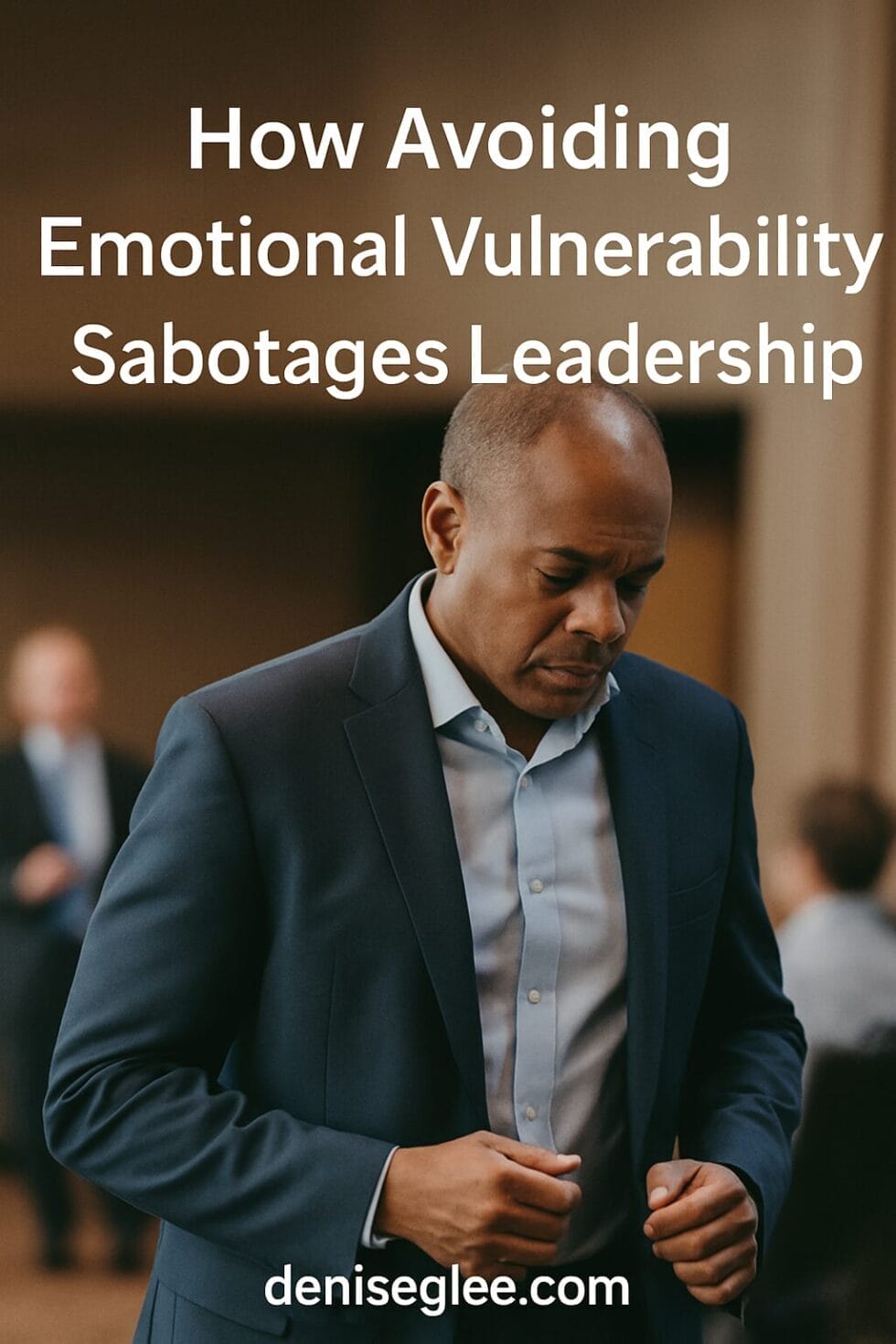
How Avoiding Emotional Vulnerability Sabotages Leadership
- Updated: March 4, 2025
As a healing and leadership coach, I’ve seen how emotional vulnerability can change lives. This is hard to do in a world where everyone seems to be pretending to be something they’re not to gain security and comfort. When we are afraid to be honest about what we need, we pull ourselves further away from what we desire most. Holding onto a fear-based persona can even lead to addiction and detachment.
I don’t want you to live miserable, sad, and fearful. That’s why in this post, we will discuss the importance of vulnerability and authenticity in leadership, especially for business owners facing personal challenges.
First, let’s talk about one reason why some of us fear being honest about our struggles with others.
Fear of Judgment: The Hidden Barrier to Emotional Vulnerability

Are you afraid to share your struggles? This fear is more common than you think. Recently, I spoke with a business owner dealing with a chronic illness.
Despite her health issues, she managed to grow her business and hire staff. When I asked why she wasn’t more open about her struggles, she said, “I don’t want anyone to judge me.”
The Difference Between Vulnerability and Oversharing in Business
Before we go further, please understand that vulnerability is not the same as transparency. By transparency, I mean sharing every single detail of your life. No one needs to know about your obsession over antique dolls (unless that is part of your brand), menstrual pains, or your sex life.
As a business owner, people want leaders they can relate to. Here are some examples of things everyone deals with at some point in their life:
- Have you had a health scare?
- Are you trying to reorganize your life after a loss?
- Are you dealing with a tough family situation?
- Have you experienced burnout or stress from work?
- Are you coping with a breakup or relationship problems?
- Do you have fears about your future?
- Are you struggling with self-doubt or confidence issues?
These are the kinds of real-life challenges that make you relatable to others. Sharing how you handle these situations can help people connect with you on a deeper level.
You don’t have to keep a plastic smile on your face all day and pretend that life isn’t hitting you hard. But you also don’t need to give people a front seat to all of your drama. There is a balance—show that you are okay with imperfection and bring your concerns, challenges, and frustrations to appropriate people in private settings.
Emotional vulnerability is all about making others feel comfortable enough to share their feelings, concerns, or fears without feeling judged or criticized.
Denise G Lee Tweet
Who Should You Open Up To? The Key to Safe Vulnerability
Even though I’m a life coach, I’m amazed at the details people share with me online. This happens because I’m open about being a recovering addict and a sexual assault survivor, as well as a mother and wife.
But don’t get it twisted—just because I teach about healing and healthy communication doesn’t mean I share every struggle I deal with. I share what I’ve learned to help others learn from my example. In private, I share my struggles with my spiritual mentors and coach.
Next, let’s dig into why emotional vulnerability in business matters to not just prospective clients, but everyone you deal with as a leader.
3 Ways Vulnerability Strengthens Leadership and Business Success

1. Building Trust Through Emotional Vulnerability
Have you ever had someone at a job that you absolutely loved talking with? They were the person you found yourself asking questions about everything except work.
I remember an older co-worker everyone called Mama Gail, even though she wasn’t anyone’s actual mother.
Whether someone was having a good or bad day, Mama Gail was always there with a little candy treat and a smile. No matter what was happening at work, everyone knew Gail had the right words to say. Even the grumpiest people couldn’t say anything bad about her, except that she “always looked pleasant.” Haters.
This is what emotional vulnerability is all about. It’s about making others feel comfortable enough to share their feelings, concerns, or fears without feeling judged or criticized.
This is the heart of building your soft skills or emotional intelligence. It means resisting the urge to fix, judge, or bully your way into the outcomes you think are best.
Trustworthy people meet others where they are, not where we think they should be. Are you considered trustworthy? If not, maybe it’s time to ask yourself how you respond to people who show less-than-redeemable traits.
Recognizing a controlling personality can help you avoid toxic dynamics. When leaders operate from fear rather than trust, they may try to control their environment or team members instead of fostering genuine connections. True leadership comes from embracing vulnerability, not enforcing dominance.
2. Why Leaders Who Embrace Vulnerability Are More Relatable

Beyond delivering results, most people want to work with those who are emotional vulnerability. These are the people who stumble, fumble, and don’t have everything 100% perfect.
When you embrace your imperfections and share your authentic self, you allow others to feel okay about their own stumbles and fumbles. This relatability can be a powerful tool in building strong, lasting relationships with your clients and team members.
Caution: Do not use this time to vent about what you think should or shouldn’t happen. Otherwise, you may find yourself receiving blowback like Qu Jing, the former head of public relations at Baidu.
Striking the Balance: How Much Should Leaders Share?

There is a balance in how, when, and why we share that helps rather than hurts others. Here are a few questions for you to know if you are sharing too much or too little:
- Are you sharing your story with anyone?
- Do people know you’re more than just a machine trying to make money?
- Are you letting people see the real you?
- Are you opening up about your struggles and challenges?
- Or are you telling everyone every little detail, even when it’s too much?
- Are you finding a good balance between sharing enough and sharing too much?
I hope this helps. If you’re looking for more examples on creating healthy conversations with your online audience, consider taking my course, Contagious Content.
3. Breaking Free from False Narratives Through Vulnerability

When you’re ready and willing to talk about what really happened—without fear of judgment—it opens the door to seeing things more clearly. In the early stages of my healing and recovery journey, I believed I needed to present a “cleaned-up” version of myself to some people while sharing the raw, painful details with others. I thought I could predict who was “worthy” or “capable” of handling my story. Looking back, that was delusional—it’s impossible to know how others will process or respond.
As I stopped letting those limiting thoughts guide me and allowed the people around me to form their own responses, I began to feel more at ease—not just with my past, but with the emotions I was experiencing in the present.
I recently shared more about this idea of resistance in a social media post. Click the link to join the conversation.
Next, let’s talk about how entrepreneurs use their vulnerability to expand their personal brand.
Have you decided not to be part of RESISTANCE 2.0?
— Denise G. Lee (@DeniseGLee) January 21, 2025
No, I’m not talking about what’s happening in the White House.
I’m talking about the choices that hurt rather than help you become the best version of yourself.
You know, the moments when you listen to the voice in your head…
Real-Life Examples of Leaders Who Thrive Through Vulnerability
Oprah Winfrey and Dwayne “The Rock” Johnson have touched many lives by being honest about their struggles. They openly talk about their challenges, which helps people connect with them in a real way. This honesty makes them relatable and inspiring. By sharing their stories, they encourage others to face their own problems with courage and hope.
Oprah and Johnson’s honesty resonates for several reasons:
- Breaking Stigmas: Talking about personal issues helps break down negative stereotypes about mental health and self-doubt.
- Inspirational: They turn their tough moments into motivational stories, providing hope and inspiration.
- Openness: Their openness makes them seem more human and relatable, helping their audience feel a deeper connection.
Through their constant emotional vulnerability, Oprah Winfrey and Dwayne Johnson have built strong bonds with their audiences, inspiring millions to embrace their truths and pursue personal growth.
Now that you know vulnerability is a good thing, let’s discuss five practical ways you can be more authentic with others.
Living Your Truth: A Step-by-Step Guide to Emotional Vulnerability

Step 1: Open Up About Your Challenges
Talk about your challenges. Share your ups and downs, successes and failures. This honesty can help you connect with others and build trust. For example, if you’re dealing with a long-term illness, share how it affects your daily life and work. This can inspire others who face similar issues and show them they are not alone.
Sharing your story can also motivate others. When leaders talk about how they overcame problems, it can encourage their teams to keep going through their own challenges. This creates a strong sense of teamwork.
Step 2: Acknowledge Your Growth (Even the Small Wins)
Notice and celebrate your progress, even the small steps. This boosts your mood and shows others that progress is a journey. Celebrating small wins helps you stay motivated and focused. It also shows your team that every step forward is important.
Celebrating small wins improves team spirit and productivity. By recognizing the efforts of your team, you create a positive work environment. This encourages a mindset focused on growth, rather than perfection.

Step 3: Surround Yourself with a Strong Support System
Find a supportive group of people. This can be friends, family, or a professional community. Having people who understand and encourage you can make a big difference. Join a group or find a mentor who has faced similar challenges. This support system can give you valuable advice and help you through tough times.
Having a support network is important for growth. Trusted friends and advisors provide different viewpoints, advice, and encouragement. They also help keep you accountable, helping you stay focused on your goals.
Step 4: Practice Self-Compassion Daily
Treat yourself with kindness. It’s okay to have bad days and not have everything figured out. Self-compassion helps you stay calm and strong. According to Dr. Kristin Neff, treating yourself like you would a friend can reduce stress and improve your well-being.
Self-compassion means understanding that everyone makes mistakes and treating yourself kindly. This helps leaders manage stress and avoid burnout. By showing self-compassion, leaders encourage their team to take care of themselves, leading to a healthier and more productive workplace.
Step 5: Foster Open and Honest Communication
Encourage open and honest talks in your work and personal life. This helps everyone feel safe to be themselves. By being real, you can build stronger teams and improve communication.
Honest talks involve listening, empathy, and being open. These talks build trust and help teams work better together. By creating a safe space for open dialogue, leaders encourage their team to share ideas, feedback, and concerns, leading to better decisions and outcomes.
Okay! I hope these tips helped. I summarized them in the image below. Next, I will share my final thoughts.

Final Thoughts: Leading with Vulnerability for Long-Term Success
Being open and honest as a leader can greatly impact your business and personal life. By sharing your struggles, you build trust, connect with others, and create a supportive environment. People will judge you no matter what, so be true to yourself and inspire others to do the same.
How have you shown your ability to be vulnerable and open to sharing your story and feelings with others? I’d love to hear about your experience. Please let me know using this link.
If you want to learn more about how being real can transform your business, I invite you to work with me. Together, we can improve all areas of your life.
Also, listen this episode of my entrepreneur podcast where I discuss the power of being honest with others.







